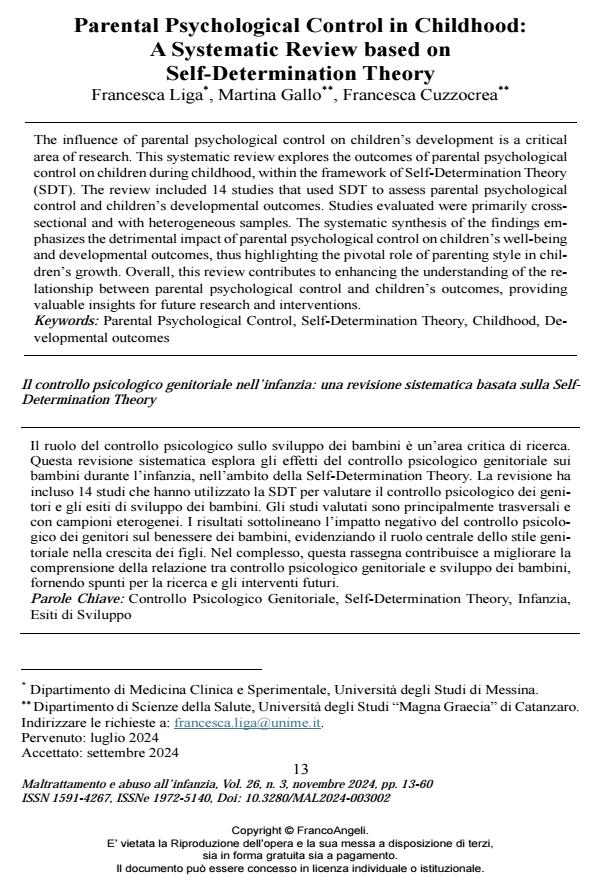Parental Psychological Control in Childhood: A Systematic Review based on Self-Determination Theory
Titolo Rivista MALTRATTAMENTO E ABUSO ALL’INFANZIA
Autori/Curatori Francesca Liga, Martina Gallo, Francesca Cuzzocrea
Anno di pubblicazione 2024 Fascicolo 2024/3
Lingua Inglese Numero pagine 48 P. 13-60 Dimensione file 313 KB
DOI 10.3280/MAL2024-003002
Il DOI è il codice a barre della proprietà intellettuale: per saperne di più
clicca qui
Qui sotto puoi vedere in anteprima la prima pagina di questo articolo.
Se questo articolo ti interessa, lo puoi acquistare (e scaricare in formato pdf) seguendo le facili indicazioni per acquistare il download credit. Acquista Download Credits per scaricare questo Articolo in formato PDF

FrancoAngeli è membro della Publishers International Linking Association, Inc (PILA), associazione indipendente e non profit per facilitare (attraverso i servizi tecnologici implementati da CrossRef.org) l’accesso degli studiosi ai contenuti digitali nelle pubblicazioni professionali e scientifiche.
The influence of parental psychological control on children’s development is a critical area of research. This systematic review explores the outcomes of parental psychological con-trol on children during childhood, within the framework of Self-Determination Theory (SDT). The review included 14 studies that used SDT to assess parental psychological control and children’s developmental outcomes. Studies evaluated were primarily cross-sectional and with heterogeneous samples. The systematic synthesis of the findings em-phasizes the detrimental impact of parental psychological control on children’s well-being and developmental outcomes, thus highlighting the pivotal role of parenting style in chil-dren’s growth. Overall, this review contributes to enhancing the understanding of the rela-tionship between parental psychological control and children’s outcomes, providing valu-able insights for future research and interventions.
Il ruolo del controllo psicologico sullo sviluppo dei bambini è un’area critica di ricerca. Questa revisione sistematica esplora gli effetti del controllo psicologico genitoriale sui bam-bini durante l’infanzia, nell’ambito della Self-Determination Theory. La revisione ha incluso 14 studi che hanno utilizzato la SDT per valutare il controllo psicologico dei genitori e gli esiti di sviluppo dei bambini. Gli studi valutati sono principalmente trasversali e con cam-pioni eterogenei. I risultati sottolineano l’impatto negativo del controllo psicologico dei ge-nitori sul benessere dei bambini, evidenziando il ruolo centrale dello stile genitoriale nella crescita dei figli. Nel complesso, questa rassegna contribuisce a migliorare la comprensione della relazione tra controllo psicologico genitoriale e sviluppo dei bambini, fornendo spunti per la ricerca e gli interventi futuri.
Parole chiave:Controllo Psicologico Genitoriale, Self-Determination Theory, Infanzia, Esiti di Sviluppo
Francesca Liga, Martina Gallo, Francesca Cuzzocrea, Parental Psychological Control in Childhood: A Systematic Review based on Self-Determination Theory in "MALTRATTAMENTO E ABUSO ALL’INFANZIA" 3/2024, pp 13-60, DOI: 10.3280/MAL2024-003002